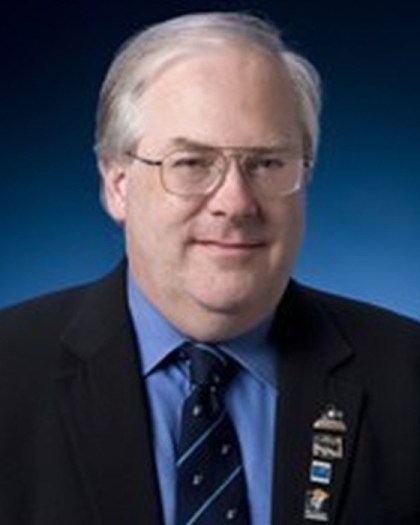
|
Ralph L. McNutt Jr.
|
| Title: |
Physicist, Principal Professional Staff |
| Industry: |
Education |
| Type of Organization: |
University |
| Major Product/Service: |
Higher education |
| Expertise: |
Dr. McNutt specializes in space physics. He works on NASA missions as part of a science team. He served as a Co-Investigator and Project Scientist on the Mercury Surface, Space Environment, Geochemistry, and Ranging (MESSENGER) mission. Dr. McNutt is also a Co-Investigator of the Integrated Science Investigation of the Sun suite on Parker Solar Probe( Institutional Co-I for the EPI-Lo Instrument), Co-Investigator on the New Horizons mission (Principal Investigator for the PEPSSI instrument) and Co-Investigator with the Voyager PLS and LECP instruments. He was a member of the Ion Neutral Mass Spectrometer Team on NASA's Cassini Orbiter spacecraft. |
| Geographic Area of Distribution: |
International |
| Affiliations: |
Trustee, International Academy of Astronautics; Associate Fellow, American Institute of Aeronautics and Astronautics; Chair, COSPAR Panel on Interstellar Research; Member, American Astronomical Society; Division for Planetary Sciences; American Geophysical Union; Sigma Xi; The Planetary Society; American Nuclear Society |
| University/Degree: |
B.S., Physics, Summa Cum Laude, Texas A&M University, 1975; Ph.D., Physics, M.I.T., 1980 |
| Married: |
1980 |
| Children: |
3 sons |
| Work History: |
Previously, Dr. McNutt served a technical staff member with Sandia National Laboratory from 1980 through 1981, with the MIT Research Staff and Physics Department from 1981 through 1990, and has been with the Applied Physics Laboratory since 1992. He served as a Principal Investigator for NASA "Vision Mission" concept (interstellar probe), Principal Investigator for NASA Supporting Research and Technology (SR&T) grant on interaction of the solar wind and very local interstellar medium and for modeling of Neptune’s magnetosphere, Principal Investigator, Phase I and II studies of Interstellar Probe architecture-NASA Institute for Advanced Concepts (NIAC), JHU/APL Instrument Scientist, Near Earth Asteroid Rendezvous (NEAR) X-Ray and Gamma-Ray Spectrometer (XGRS) Facility Instrument, Study Lead JHU/APL Pre-Phase A study of a solar probe spacecraft and Principal Investigator with NASA Solar System Exploration Division Planetary Instrument Definition and Development Program (PIDDP) grant for the development of a compact energetic particle detector, from which came the Pluto Energetic Particle Spectrometer Science Investigation (PEPSSI) flying on the New Horizons Mission. Dr. McNutt was also a Principal Investigator for an effort on outer planet radioisotope electric propulsion – NASA Glenn Research Center. He worked on physics of the magnetospheres of the outer planets, physics of the outer heliosphere including solar wind dynamics and properties of the very-low frequency (VLF) radiation, Pluto’s atmosphere, pulsars, physics of high-current electrons beams, the physics of active experiments in the mesosphere/thermosphere (artificial aurora) and the solar neutrino problem. Dr. McNutt served as an Associate Editor of Geophysical Research Letters from 1994 to 1996. At APL, he was also the Deputy Project Scientist, Nuclear Electric Propulsion Space Test Program (NEPSTP; DoD/SDIO). |
| Honors & Awards: |
National Finalist in the competition for the 1987-1988 class of White House Fellows; Recipient, APL Lifetime Publication Award, 2020; NASA Silver Achievement Medal to the Parker Solar Probe Team, 2019; IAA Laurels for Team Achievement Awards for New Horizons (Team Award, 2016); MESSENGER Team Award, 2012; 13 NASA Group Achievement Awards; Minor Planet 172191 Ralphmcnutt named for him |
| Published Works: |
Author, 220 papers; 150+ professional and popular talks including press conferences and live interviews |
| Career Accomplishments: |
Mr. McNutt co-chaired the National Academies studies on radioisotope power systems in 2009 and NASA's largest strategic science missions in 2017. He is the principal investigator on the study of a pragmatic interstellar probe mission for NASA's Heliophysics Division (since 2018) and has chaired the Nuclear Power Assessment Study for NASA in 2015. Mr. McNutt testified to Congress in 2017 on 'Radioisotope Production and Lessons Learned from Cassini.' He also served a term as the Chief Scientist for NASA's Planetary Data System and led the 2017 Roadmap Study. |

